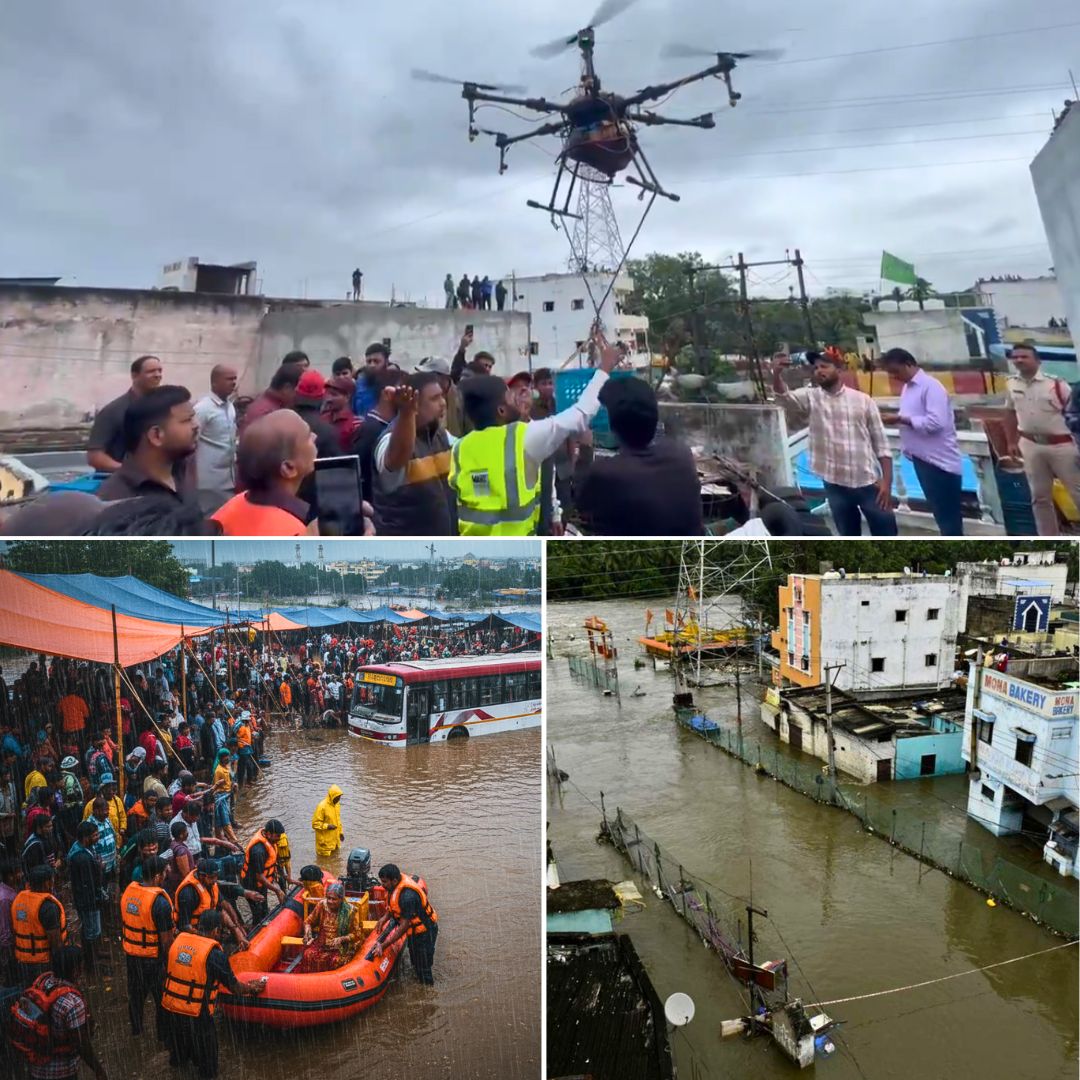Heavy rains on September 26 and 27, 2025, caused severe flooding and disruption in Hyderabad and parts of Telangana, following the opening of floodgates at Himayatsagar and Osmansagar reservoirs. The Musi River swelled to dangerous levels, inundating low-lying areas and key infrastructure, including the Mahatma Gandhi Bus Station (MGBS).
Amid continued weather warnings from the India Meteorological Department (IMD), authorities evacuated about 1,000 residents to relief camps and ensured essential supplies, while passengers stranded at the flooded bus station were safely relocated.
Telangana Chief Minister A. Revanth Reddy and officials, including HYDRAA Chief Ranganath and AIMIM MLA Ahmed Balala, closely monitored the situation and coordinated rescue efforts to ensure public safety.
Evacuations and Emergency Response
The sudden rise in water levels prompted emergency evacuations across flood-prone neighbourhoods such as Moosarambagh and Chaderghat. Around 1,000 residents from low-lying areas were shifted to relief camps where they were given food, water, and other basic necessities.
The administration deployed drones in some affected areas, like Chaderghat, to deliver emergency food supplies to families stranded by waterlogged roads. Authorities also temporarily suspended bus operations from MGBS, relocating services to alternate locations to avoid stranding commuters.
Telangana Road Transport Corporation Managing Director V.C. Sajjanar explained that the halt in services was essential for passenger safety and that operations would resume only after water receded to safe levels. The police closed roads near the Chaderghat bridge to prevent accidents, leading to traffic congestion in surrounding areas.
Impact on Infrastructure and Public Life
The flooding severely impacted the day-to-day life of Hyderabad’s citizens, flooding homes, streets, and vital transport hubs. MGBS, one of the city’s busiest bus stations, was submerged, requiring the safe evacuation of approximately 2,000 waiting passengers.
Several colonies adjacent to the Musi River, including large parts of the Old City, faced extensive waterlogging, with some houses reported to be fully submerged. The under-construction Moosarambagh bridge also faced safety concerns as strong water currents washed away critical centering equipment, raising fears of structural damage.
The Telangana government issued advisories to IT firms to allow employees to work from home to reduce city traffic, improving emergency response efforts and reducing commuter risk during the ongoing rains.
Context and Ongoing Measures
This flooding event is part of a broader pattern of increasingly unpredictable and intense monsoon rains affecting Telangana’s urban centres. The IMD forecast predicted continued isolated heavy showers and thunderstorms, urging citizens and authorities to remain vigilant. Telangana Chief Minister Revanth Reddy directed all relevant departments-including police, traffic, electricity, and municipal bodies-to maintain high alert and coordinate rescue and relief operations effectively.
The government also set up display boards at crucial waterlogging hotspots to alert the public. Civil society groups have highlighted the urgent need for structural reforms in urban flood management and improved community early-warning systems, pressing authorities to implement sustainable solutions and improve communication regarding reservoir releases to reduce risk ahead of time.
The Logical Indian’s Perspective
The Hyderabad floods of 2025 vividly illustrate the urgent need for cities to prepare resiliently for climate-induced challenges, balancing rapid urbanisation with sustainable infrastructure development. The immediate response by disaster management teams and technological innovation like drone deliveries show promising adaptive measures, but systemic issues remain.
Enhanced coordination between community networks and government, reliable early-warning systems, and investment in robust drainage and flood-control infrastructure are critical. The Logical Indian advocates for policies prioritising public safety, environmental foresight, and inclusive planning that empowers affected communities.
Relief operations are underway in Chaderghat, where food is being delivered by drones to residents stranded on rooftops due to the overflowing Musi River. pic.twitter.com/Rzn6Cqgb0n
— Jacob Ross (@JacobBhoompag) September 27, 2025











